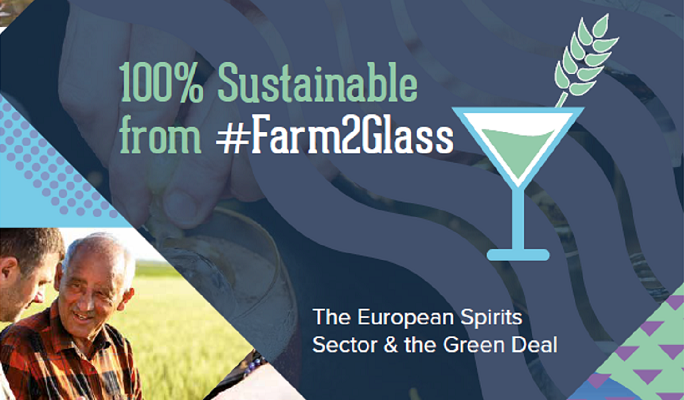
For the spirits sector, the carbon footprint is quite low overall, especially when compared to other drink categories. For spirits, the most significant factors contributing to our carbon footprint are: farming (around 25% to 30% of our total carbon footprint); distillation (ca. 30% to 40%); packaging (ca. 24% to 37%) and Transport & Retail (ca. 3% to 10%).
In line with our ambition to be climate neutral by 2050, our members are working on dedicated projects to reduce the environmental impact and carbon footprint in these areas and many examples are presented on our public web-portal www.drinksinitiatives.eu. You will find ambitious projects in which distillers are working in close cooperation with farmers to significantly reduce the use of pesticides and fertilisers; to promote biodiversity and to develop and enforce certification schemes including criteria to protect the environment and communities. As water is a vital element in the production of spirits, distilleries are typically located close to natural water sources. Water is used as an ingredient, for fermentation, cooling, and the cleaning of bottles. You will discover how we work at reducing the overall water consumption and why we are engaged in numerous water preservation programmes across Europe.
Distillation requires energy, in particular for heating. Thanks to innovative technologies and improved energy efficiency many distilleries are decreasing their overall energy consumption and also switching to renewable energy sources. Something that is not well-know outside our sector is our capacity to re-use any by-products that may be produced during spirits production in ways that benefit the environment, local communities and businesses. You will see that for instance, “stillage” - a typical by-product of distillation and naturally high in protein – is handed over to farmers in our rural communities to feed farm animals.
Wooden barrels are a precious asset to bring some of our most iconic spirit drinks such as whisky or wine spirits to maturity. Did you know that in Europe, only oaks trees of at least 150 years can be used to make new barrels? This is why we are fully committed to the long-term sustainable management of European forests. On top, there is no waste because reuse is for some spirit categories the governing rules to aged your favourite drink.
Being sustainable from #Farm2Glass means we are using packaging that is fully recyclable. Over 90% of spirit drinks are sold in glass bottles with an EU collection rate for recycling at 76% in 2017. Many companies are working on projects to increase the share of recycled content in glass bottles and to decrease the bottle weight. #Farm2Glass also means we work hand-in-hand with colleagues in the hospitality sector to reduce as much as possible waste in bars and reuse some of the ingredients you find in your cocktails!
Last but not least, our high-quality products are enjoyed and appreciated all over the world. Transport emissions constitute only a small percentage of the total carbon footprint of food & drink products – around 6% globally. To reduce our footprint in these areas, we are working closely with our supply chain partners to make logistics processes more resource-efficient.